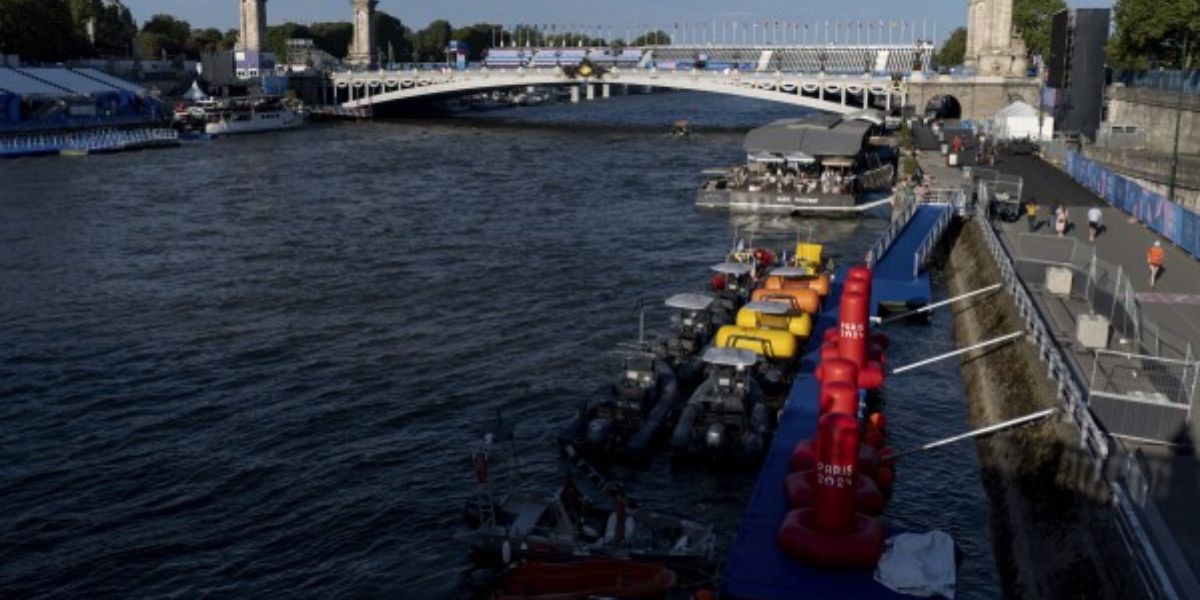Men’s Olympic Triathlon Postponed Due to Seine River Water Quality Concerns; Women’s Event Still on Schedule
The men’s Olympic triathlon scheduled for Tuesday has been postponed due to worries over the water quality in Paris’ Seine River, where the race’s swimming portion was set to take place.
Organizers said they would try to hold the men’s triathlon on Wednesday instead. The women’s competition is also set for Wednesday, but both are subject to water tests. Friday is also scheduled as a backup date.
However, Meteo-France, the French meteorological office, predicted storms Tuesday night, light rain Wednesday afternoon, and storms Thursday, complicating the event rescheduling.
Heavy rains typically increase the levels of E. coli and other bacteria in the Seine. Paris endured a rainstorm during the Olympic opening ceremony on Friday, and the rain continued into Saturday. The swimming phase of training events designed to familiarize triathletes with the course was canceled on both Sunday and Monday due to concerns about water quality.
The decision to postpone the men’s triathlon came after a meeting early Tuesday morning with the sport’s governing organization, World Triathlon, its medical staff, and city officials.
“Despite the improvement in water quality levels in the last hours, the readings at some points of the swim course are still above the acceptable limits,” organizers said in a statement announcing the postponement, emphasizing that their “priority is the health of the athletes.”
The men’s event has been rescheduled for 10:45 a.m., which may increase the risk of heat. Wednesday’s peak temperature is expected to reach 95 degrees Fahrenheit (35 degrees Celsius), and the event may conclude during the warmest part of the day. The women’s race will take place at 8 a.m. on Wednesday, as planned.
Organizers and local officials had expressed optimism that bacteria levels would improve when skies cleared and temperatures warmed in the days that followed, but it appears that this was insufficient to secure the athletes’ safety.
Paris made a significant effort to repair the water quality of the long-polluted Seine so that the triathlon and marathon swimming events in August could take place in the city’s iconic river. However, bacterial levels have fluctuated.
Daily water quality testing detects levels of fecal bacteria known as E. coli, with a permissible limit of 900 colony-forming units per 100 milliliters set by European standards. The monitoring group Eau de Paris distributes statistics every Friday, however, it is only updated through the previous Tuesday.
High amounts of E. coli in water may suggest sewage contamination. The majority of strains are innocuous, and some dwell in the intestines of healthy humans and animals. However, others can be harmful. Even a mouthful of infected water can induce diarrhea, and the bacterium can also cause infections in the urinary tract or intestines.
The effort to make the river swimmable cost 1.4 billion euros ($1.5 billion). They include the creation of a massive basin to absorb surplus precipitation and prevent wastewater from spilling into the river, as well as the renovation and upgrading of sewer infrastructure and wastewater treatment facilities.
Two weeks ago, Paris Mayor Anne Hidalgo, Paris 2024 CEO Tony Estanguet, and the senior government official for the Paris area, Marc Guillaume, joined swimmers from local swimming clubs in a highly public swim in the river. Data released this week suggest that E. coli levels at the Bras Marie were 985 units per 100 milliliters that day, slightly more than the specified threshold.
Other swimming events planned for the Seine include a triathlon mixed relay on August 5 and women’s and men’s marathon swimming races on August 8 and 9.

